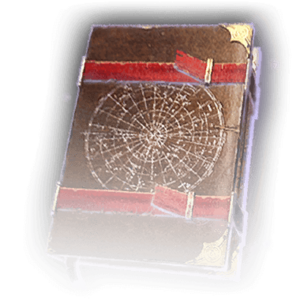Ad placeholder
What Abides Below: Difference between revisions
No edit summary |
(coords) |
||
| Line 18: | Line 18: | ||
| weight lb = 1 | | weight lb = 1 | ||
| price = 14 | | price = 14 | ||
| where to find = * [[Rainforest's Basement]] | | where to find = * [[Rainforest's Basement]] {{coords|1421|1052}} | ||
* [[Arfur's Mansion]] {{coords|40|-75}} | * [[Arfur's Mansion]] {{coords|40|-75}} | ||
| notes = | | notes = | ||
Revision as of 03:57, 9 February 2024
What Abides Below is a common Book that offers a few minor details about the history of Baldur's Gate, and suggests that there may be a mystery to explore within its sewer system.
This book is redolent with the enticing smell of paper and ink.
Properties
 Books
Books Rarity: Common
Rarity: Common Weight: 0.5 kg / 1 lb
Weight: 0.5 kg / 1 lb Price: 14 gp
Price: 14 gp
Where to find
- Rainforest's Basement X: 1421 Y: 1052
- Arfur's Mansion X: 40 Y: -75
Text
Plamondon tells us that Grey Harbour was a small coastal village before Balduran returned with his vast sea-treasure and founded a great city here. But the vast subterranean ruins hidden beneath our modern city's sewer system tell a very different story.
There was a city on the bight of the Lower Chionthar ages before Balduran built his Seatower, a metropolis of grand boulevards and granite towers open to the sky before the unknown cataclysm that split them to their foundations and then swallowed them into the bedrock.
Who were these forgotten people who lived in the age before Balduran? Perhaps more importantly, who or what still lives in the ruins of that tumbledown port town below? What things, creatures, or creations, lurk deep beneath our streets - and do they have designs on what we like to think of as our world on the surface above?
Notes
- Adds interesting flavor to the recorded history of Balduran.
- Credits him with constructing a "Seatower" (
 Seatower of Balduran)
Seatower of Balduran) - Mentions his "return" to the region in possession of a "vast sea-treasure."
- Credits him with constructing a "Seatower" (
- The Undercity Ruins is most likely "the vast subterranean ruins" the text is referring to.
- It's not clear who "Plamondon" is meant to be, but the phrasing feels like someone quoting real-life Aristotle, so it might be meant as flavor to make the writing style feel more academic.
